
Lumbar Disc Herniation
Lumbar disc herniation is a common condition that affects the lower back and can cause significant pain and discomfort. This condition occurs when the soft cushion-like discs between the vertebrae in the lower back rupture or bulge outwards, putting pressure on nearby nerves. Understanding the causes, symptoms, diagnosis, and treatment options for lumbar disc herniation can help individuals manage and alleviate their symptoms effectively.
Causes: Lumbar disc herniation can be caused by various factors, including age-related wear and tear on the spinal discs, repeated strain on the back from activities such as heavy lifting or twisting, obesity, genetics, and certain lifestyle factors. These factors can weaken the outer layer of the disc, making it more susceptible to herniation.
Symptoms: The symptoms of lumbar disc herniation can vary depending on the severity of the condition and the location of the affected disc. Common symptoms include lower back pain that may radiate down the leg (sciatica), numbness or tingling in the legs or feet, weakness in the leg muscles, and difficulty standing or walking. In severe cases, lumbar disc herniation can lead to loss of bowel or bladder control, which requires immediate medical attention.
Diagnosis: Diagnosing lumbar disc herniation typically involves a physical examination, medical history review, and imaging tests such as X-rays, MRI, or CT scans. These tests help healthcare providers determine the location and extent of the herniated disc and identify any nerve compression that may be occurring.
Treatment: Treatment options for lumbar disc herniation may include conservative measures such as rest, physical therapy, anti-inflammatory medications, and epidural steroid injections to reduce pain and inflammation. In cases where conservative treatments are not effective, surgery such as a discectomy may be recommended to remove the herniated portion of the disc and relieve pressure on the nerves.
It is essential for individuals experiencing symptoms of lumbar disc herniation to seek medical attention promptly to receive an accurate diagnosis and appropriate treatment plan. With proper management and lifestyle modifications, many individuals with lumbar disc herniation can experience relief from pain and improve their quality of life.